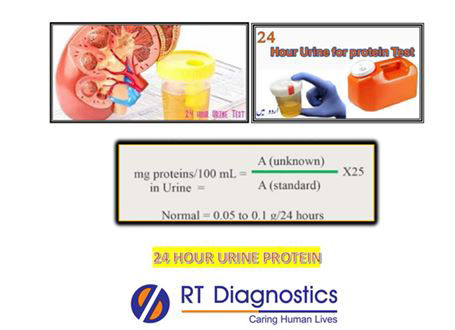24 HOUR URINE PROTEIN TEST:
24 Hour Urine protein test evaluates the protein amount present in the urine. In healthy kidneys, no proteins would be released in the Urine. So the protein in the urine is the sign of kidney diseases/disorders. This test helps to diagnose kidney diseases and monitor the function of the kidney while prognosis.
CLINICAL INFORMATION :
This test is usually done for altered levels of proteins in blood i.e. either in high or low. Symptoms include intestinal discomfort and indigestion, dehydration, exhaustion, nausea, irritability, headache, diarrhea, etc. This test is suggested in patients with symptoms of protein abnormalities reflected in signs and symptoms and in urine causing frothy urine, fluid retention causing swelling, weakness, rapid heartbeat, vomiting, diarrhea, and nausea, etc. Other associated tests include chromatography, colorimetric methods, spectroscopic methods, kit methods, etc.

General instructions:
SampleRequirement:Specimen - 24 hours of urine specimen, TestPreparation: None.
NOTE - Sample for specimen collections may vary based on the patient’s condition/cases according to the patient’s presenting complaints/signs or symptoms:
SPECIMEN REQUIREMENT (Special or Rare Cases) - As instructed and guided by Physician / Clinician / Pathologist / as per Laboratory’s requirements, according to procedures and protocols.
This Multi-Specialty Clinical Referral Laboratory “RTDIAGNOSTICS” provides precise and accurate tests with an extensive range of testing services to the medical centers to help in the diagnosis and identification of pathology in the test specimens for infectious diseases and also to evaluate the function of organ systems of the patient. It prevents further complications and helps to stabilize and restore health to near normalcy at the earliest without delay.



